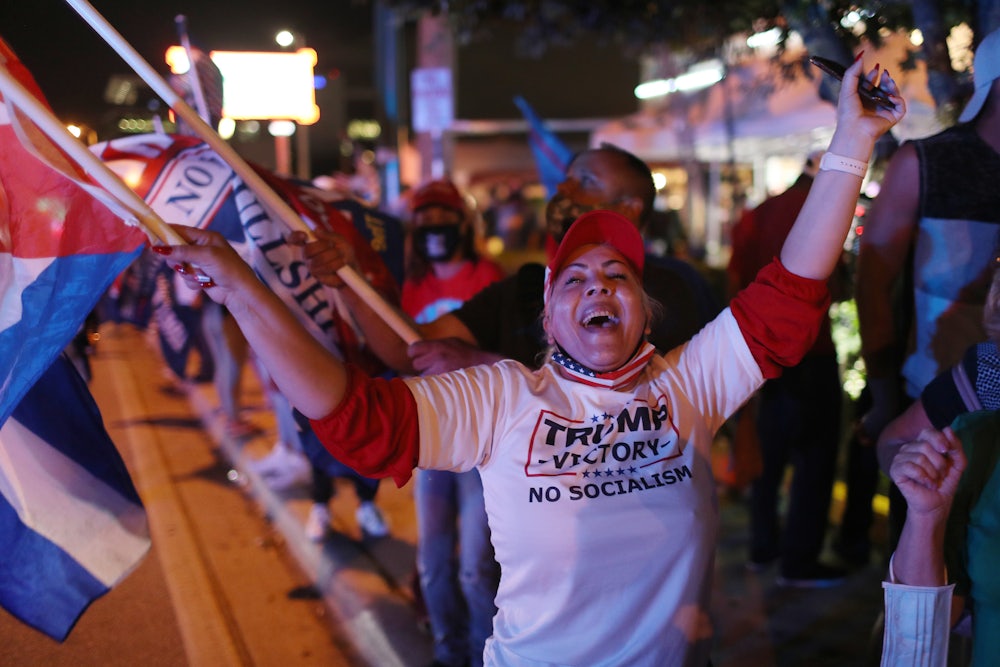Early Tuesday night, Fox News gave Democratic viewers rare cause for optimism. Exit polls, the network reported, had found that 70 percent of voters support increased government spending on green and renewable energy. Seventy-two percent were somewhat or very concerned about the effects of climate change. It tracked with polling done just before Election Day, which found that the more ambitious green planks of Joe Biden’s platform, put there thanks in large part to pressure from his left, are broadly popular. The numbers were particularly notable for being publicized on Fox News, renowned home of climate denial. But they raised a more important question, too: If such commanding majorities in the country support big, progressive policies, then why don’t we have them yet? And why do politicians who support them struggle?
The disconnect between popular opinion and public policy on this subject isn’t surprising. The same organizations and think tanks that have spent decades spreading climate denial also worked to insulate their corporate funders from democratic majorities. After the New Deal worked to constrain them and brought Democrats big electoral wins, wealthy men set about preventing a recurrence, making their power invulnerable to popular will through voter suppression, stacked courts, trade deals, and gerrymandered congressional districts. Because telling people you want to suppress their voice has never been terribly popular, gaining electoral power involved both crushing democratic institutions like unions—through mass firings, for instance—and playing up the country’s ugliest heritage, to divide groups that might otherwise band together as a majority to fight off plutocratic rule. White supremacy has been particularly useful in fracturing coalitions demanding a more egalitarian society. And in an apartheid state whose constitution was written by and for slaveowners, those looking to exploit racism for profit had a lot of material to work with.
Elites hoping for a bulwark against democracy built and commandeered whole media outlets like the National Review and Fox News and academic departments like the University of Virginia’s economics program. Professors and pundits insisted to the public that slashing corporate taxes and entitlement programs would be good for the economy, that freedom meant free markets, that fighting crime meant terrorizing Black and brown communities, and that climate change was a matter of scientific debate. It may have taken a few decades and failed presidential bids, but that phenomenally well-funded effort has been hugely successful, not just at winning power but in changing what constitutes common sense for politicians on both sides of the aisle. Captains of industry may now find Trump a bit unseemly, but they built his presidency all the same.
The project has resulted in a disconnect between what an overwhelming majority of voters want and what prevailing logic, particularly among politicians, suggests is feasible or economically sound. To put it another way, there’s a gap between policies voters claim to want and the politicians they’re choosing (albeit off a limited menu). Even if Joe Biden ultimately prevails in the states where votes are still being counted, Democrats—for now, the only party reckoning with global warming in a remotely serious way—seem unlikely to gain the seats in the Senate they’d need to pass robust climate policy.
There are few easy lessons to take from this mess. Democrats running to the right—like Amy McGrath and Max Rose—didn’t have a great night. Yet candidates running on bold, equitable climate policies in Texas and Nebraska weren’t able to flip red seats there. It’s possible, of course, that they couldn’t overcome the enthusiasm gap left by a somewhat lukewarm candidate at the top of the ticket. As evidenced in Bernie Sanders’s campaign, progressives have had a tendency to believe that candidates who can serve as credible vessels for popular leftist ideas can cross the finish line—a strategy that rarely works as well as planned. But then, as showcased in Hillary Clinton’s bid and many, many others, playing it safe in the center has also had a bad track record of beating back authoritarianism.
Granted: There aren’t many successful models for beating back authoritarianism, period. But whatever the Democratic establishment has been chasing since 2016 clearly isn’t working if it took more than 230,000 deaths and a crushing recession for this country to deliver Donald Trump a narrow defeat, at best. And this outcome isn’t about some inborn flaw in human nature that makes us want to elect autocrats or pour carbon into the atmosphere. It’s about a one percent historically hell-bent on suppressing democratic majorities that might have opted for another path.
Where does that leave hopes for climate policy these next four years? To win the presidency, Biden still has to win an Electoral College that can arrive at a very different result than a majority of Americans. He might have to weather a court challenge to make sure all the votes are counted. If he gets to the Oval Office, he’ll be hemmed in by a Senate that gives more say over how the country is run to tracts of land than city-dwellers. Virtually unlimited amounts of political donations and lobbyists will flow in to stop anything that might challenge profits somewhere. Republicans and Democrats alike will listen to both dollars and shills intently. If some left-leaning priorities pass those hurdles—or get handed down via executive order—they’ll likely face federal courts stocked to the gills with right-wing Federalist Society appointees groomed to ossify constitutional originalism and its ultimate outcome: minority rule. The path toward realizing the climate action that an overwhelming majority of the population wants runs through laws and institutions built to make such changes impossible.
Saving democracy—seemingly the raison d’être of every Democrat in the country right now—isn’t a messaging battle, as donors to the Lincoln Project wagered. It’s an organizing and institution-building project and trench warfare against centuries of ideological priming.
